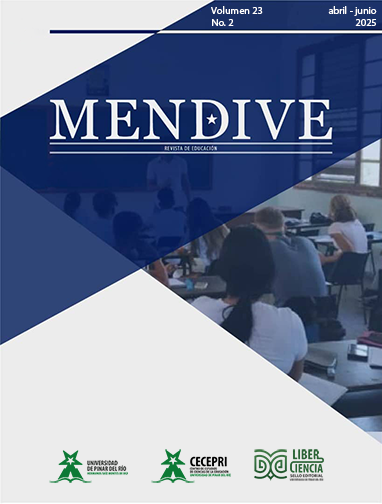Pedagogical conception for the development of multi-instrumentalism in the woodwind instrument profile
Main Article Content
Abstract
For the comprehensive development of students of the woodwind instrument profile at the upper secondary level of music, it is necessary artistic and pedagogical training that integrates the learning of multiple musical instruments, multi-instrumentalism, in accordance with their work within the professional field. Shortcomings in its development have been noted, and the full potential of this practice is not fully used. This article aims to propose a pedagogical conception for the development of multi-instrumentalism in the woodwind instrument profile. Theoretical methods such as historical-logical, analytical-synthetic, inductive-deductive, and modeling were employed, as well as empirical methods such as documentary analysis, observation, surveys, interviews, and pedagogical testing, which facilitated an understanding of the current state of development of multi-instrumentalism in the woodwind instrument profile. The main result is a pedagogical conception that highlights principles, distinctive features, and their practical implementation in a pedagogical strategy that supports an integrative relationship with the teaching-learning process at the upper secondary level of music.
Downloads
Article Details

This work is licensed under a Creative Commons Attribution-NonCommercial 4.0 International License.
References
Alfonso Morejón, A. (2015) Concepción pedagógica para la formación investigativa de los adiestrados de las carreras pedagógicas mediada por las Tecnologías de la Información y las Comunicaciones (TIC). Varona, 61,1-4. https://www.redalyc.org/pdf/3606/360643422017.pdf
Hernández Iznaga, M. del R., Rodríguez Duverger, N., & Rodríguez Núñez, Y. (2025). Sonidos y Vientos: La Aventura del Trombón Cubano con Alberto Batista Meneses. Ciencia Latina Revista Científica Multidisciplinar, 9(2), 3665-3682. https://doi.org/10.37811/cl_rcm.v9i2.17162
Beauvillard, L. (2006). Un instrumento para cada niño. Ediciones Robinbook. https://books.google.es/books?id=JHcARrrjyZAC&printsec=frontcover&hl=es#v=onepage&q&f=false
Cárdenas Quintero, C. R., Villalón Legra, G. T., & Nodarse González, N. M., (2022). Concepción pedagógica para la formación del profesional en turismo en Cuba. Universidad y Sociedad, 14(3), 664-673. http://rus.ucf.edu.cu/index.php/rus/article/view/2912
Díaz Ocampo, E., Venet Muñoz, R., Álvarez Cortés, A. B., & Guerra González, C. (2018) Concepción pedagógica de la formación permanente del docente universitario en didáctica de la educación superior en Ecuador. Revista Actualidades Investigativas en Educación, 18 (2). https://doi.org/10.15517/aie.v18i2.33175
Holoborodov, D., & Plokhotniuk, O. (2021). Multi-instrumentalism as a means of implementation of creative projects in quarantine. Knowledge, Education, Law, Management, 1(5). https://doi.org/10.51647/kelm.2021.5.1.7
Houvinen, E., & Frostenson Lööv, C. (2021). Narratives of versatility: Approaching multi-instrumentalist music teacher identities. Research Studies in Music Education. 43(3). https://doi.org/10.1177/1321103X20951942
Jorquera Rossel, R. Valverde Ocariz, X., & Godall Castell, P. (2020). Propuesta de principios alternativos para la educación musical en un contexto latinoamericano. Revista Electrónica LEEME, 46(1-16). https://turia.uv.es/index.php/LEEME/article/view/16932
Marcipar, M. (2023). La afordancia como categoría de análisis musical. Revista del ISM, (24), e0051. https://portal.amelica.org/ameli/journal/645/6454726013/html/
Parra, M. A., Hernández-Sánchez, I., Maussa, E., & Guerrero Fernández, M. B. (2018). Elementos que definen una estrategia pedagógica en la escuela de los padres del ICBF del sur-occidente de Barranquilla. Hexágono Pedagógico, 9(1), 1-14. https://doi.org/10.22519/2145888X.1245
Rojas Valdés, A., González Fernández, M., & Martínez Hernández, A. (2018). Concepción pedagógica del proceso de formación para la gestión de la extensión universitaria del año académico. Universidad y Sociedad, 10(1), 349-359. https://rus.ucf.edu.cu/index.php/rus/article/view/959
Sánchez Ortega, P. & Morales Hernández, X. (2000). Educación musical y expresión corporal. Pueblo y Educación. http://abaco.uca.edu.sv/opacbfi/verdetalle_.php?idobra=152443&searchType=materias&searchText=Expresi%F3n%20corporal&tipomaterial=0&cc=0&tipob=2
Su, K., Liu, X., & Shlizerman, E. (2020). Multi-Instrumentalist Net: Unsupervised Generation of Music from Body Movements. ArXiv, 1. https://doi.org/10.48550/arXiv.2012.03478


